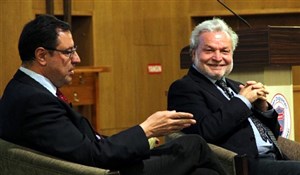 On Monday, April 18, the Department of Turkish Literature hosted an interview with Nedim Gürsel, the acclaimed Paris-based Turkish writer and scholar. The interview was held in
On Monday, April 18, the Department of Turkish Literature hosted an interview with Nedim Gürsel, the acclaimed Paris-based Turkish writer and scholar. The interview was held in
C-Block Auditorium and moderated by Assoc. Prof. Mehmet Kalpaklı, chair of the departments of Turkish Literature and History and associate dean of the Faculty of Humanities and Letters.
During the interview, Dr. Gürsel, author of several much talked-about historical novels, answered questions about his ideas on the relationship between literature and history, and his views about the responsibilities of a historical novelist. Discussing the autobiographical elements in his novels, he referred to the category of “autofiction” as a possible genre for some of his more autobiographical works. Dr. Gürsel also shared his experiences as a writer and his feelings about the controversies aroused by some of his works.
A reception was held after the interview, where the author signed his books. Dr. Gürsel is at Bilkent for two weeks, during which time he is giving a series of in-depth seminars to students in the Department of Turkish Literature.
Nedim Gürsel was born in Gaziantep in 1951. After graduating from Galatasaray High School in 1970, he went on to receive a BA in French literature from the Sorbonne. In 1979 he received a doctorate in comparative literature from the same university with a dissertation on Louis Aragon and Nazım Hikmet. In 1976 his first short story collection, “Uzun Sürmüş Bir Yaz,” was published, for which he received the Turkish Language Academy Prize. Mr. Gürsel has gone on to receive many additional awards. His works include “Boğazkesen” (1995), “Allah’ın Kızları” (2008) and “Şeytan, Melek ve Komünist” (2011). Living in Paris as a citizen of France, Dr. Gürsel teaches contemporary Turkish literature at the Sorbonne and is the research director for Turkish literature at the International French Science Research Center (CNRS).
By Nihan Simge Soyöz (EDEB/MA)
